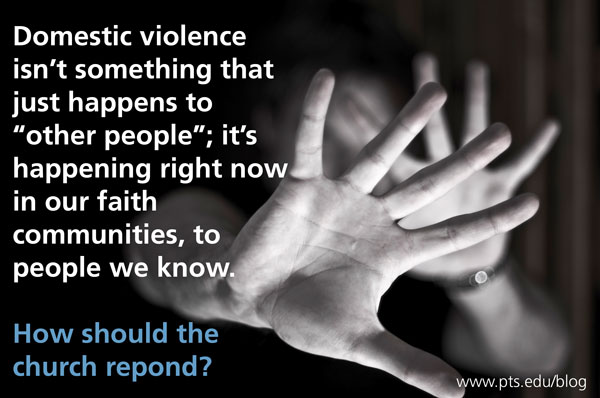Intimate partner violence (also called “domestic violence” or “relationship violence”) is a subject about which many of us in the church know very little. Even if we do know something about it, we often feel uncomfortable discussing it. That may be because we believe that it doesn’t happen to people we know. Unfortunately, that simply isn’t so. A report released in 2011 found that more than 1 in 3 women and 1 in 4 men in the U.S. have experienced rape, physical violence, and/or stalking by a partner in their lifetime. Clearly, this is not something that just happens to “other people”; it’s happening right now in our faith communities, to people we know, and that means we need to spend some time thinking about this and about how we want to respond.
But, what can churches really do about this problem? Most of us are not professionally trained in this area, so how can we help? Here are a few suggestions for ways I think the church can respond to and maybe even help prevent intimate partner violence:
- Know our limits Most clergy and other congregational leaders are not trained professionals in the area of intimate partner violence. This means that when it comes to providing direct assistance, we will often need to refer to other agencies in our community who do have this expertise. Each congregation can be prepared for this by maintaining a resource list that includes various options for help (emergency shelters, financial assistance, care and counseling services, etc.). Even better, church leaders can develop relationships with these agencies so that when we have to refer, we have a personal contact who can help the person make the transition between caring communities.
- Acknowledge our responsibility Although most congregations are not fully equipped to deal directly with domestic violence, it is important for us to think about what responsibility we do have in these situations. We may not be able to offer certain kinds of help, but we can offer pastoral and spiritual care and the support of the religious community. No survivor of abuse or violence should feel they have to choose between the help of secular agencies and the support of their faith community. They need both in order to seek healing for themselves and their families.
- Think more carefully about our language and our theology How we talk about theological themes like love, marriage, suffering, and redemption within the church may help to lay the groundwork for healthier relationships, or it may perpetuate destructive patterns between partners. If we choose to, we can paint a different picture of the way relationships should be. We can communicate to those in our faith community the norms that we uphold as God’s expectations for us in intimate relationships: equality, honesty, accountability, and mutual respect. We can say very clearly, from the pulpit and all throughout our communities, that God doesn’t want anyone to suffer needlessly, and that abuse or violence in any form is contrary to the loving relationships that God longs to create among human beings. We can also teach that forgiveness within human relationships does not mean relieving someone of responsibility for his or her actions. This might remind us all that we don’t have to excuse abuse or violence in the name of forgiveness. Instead, we can hold up a vision of healthy relationships as being free from all forms of violence and coercion, while still holding out hope that transformation is possible.
In some ways, I think this last point might be the most important, because domestic violence doesn’t begin with violent actions. Instead, it has its origins in the attitudes of people who have come to believe that it is acceptable for one person in a relationship to exercise power over another. In our religious communities, our children and young people are watching us to find models of what adult relationships should be. If we can offer them healthier, more loving, and more respectful ways of understanding relationships in light of the practices and language of our faith traditions, we will be giving them an enormous gift. And in doing so, we may even be helping to prevent relationship violence from happening in the first place.
The Rev. Dr. Leanna K. Fuller is assistant professor of pastoral care at Pittsburgh Theological Seminary and teaches in the MDiv Program. Her ministry experience includes serving as associate pastor of Oakland Christian Church in Suffolk, Va., where she coordinated youth ministry and Christian education programming. She writes regularly on pastoral care and counseling, pastoral theology, and congregational conflict.


It’s very interesting, I’m very glad to come here and read your post and thanks for sharing with us.
Great blog. This was really helpful stuff. I wish you luck as you continue to follow that passion.
Good write up – following you guys on Twitter as well.